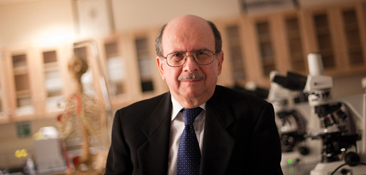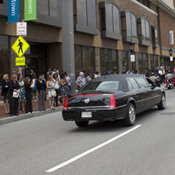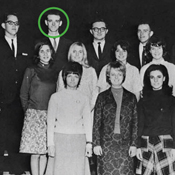Meet a Faculty Member: Donald H. Stone and Fred Brown
Category: WebExtras

Photography: Chris Hartlove
When we sat down with Fred Brown, associate professor, and Don Stone, professor, of the UB School of Law, we got twice the great content we usually do for this regular feature. You could say it was a runaway success. …
Getting Started:
Stone: I realized [going for a run] was a time to clear your head and do very little intellectually, an escape from the rest of our lives.
Brown: I find it a great stress release. I was practicing law, and one day I just decided I had to go running. So one evening, it was a winter evening, I was wearing a heavy winter coat, and I had a pair of sneakers, not running shoes, and I just started running.
Running Together:
Stone: We’re very good friends, so that’s obviously part of this. But we also motivate and push and encourage each other, so if it’s, you know, a cold day, maybe one of us would rather not go out, the other wants to go out, we talk each other into it, you know, we convince each other to run.
Brown: Running together is just so easy compared to running by yourself. I mean, running by yourself really is labor. But running with a great friend, it’s just fun. You don’t even realize you’re running sometimes. You’re just talking. And the hardest part is starting. Once you start, you’re OK, but those first couple of steps, sometimes—especially when it’s miserable out, I mean …
Boston Marathon
Stone: That was a real adventure, just getting up to Boston, planning the logistics … Just getting there, we even had one of our students drive us from the hotel to the race, because it’s complicated to even get to the start of the race from out of town. So it was a real undertaking.
Brown: We did that as bandits, because you have to qualify for that, [and] we couldn’t qualify. But you just line up at the end, and anybody can, and you just run it. And they treat you like a real person, they give you food and water.
Getting through a marathon:
Stone: It’s just so much adrenaline, you know, the last 30 minutes or so. The last three, four miles. It’s just purely [going] on something in your mind, your brain, that just pushes you to finish.
Brown: You play mental games, too. Once you get within, say, four miles of the end, you can kind of visualize it. Like, we’ve been on hundreds of four-mile runs, you know? … That’s it. That’s all it is. You just deceive yourself.
Therapy or productivity booster?
Stone: It contributes to who we are as people by making you sort of more levelheaded, well adjusted. It’s not therapy, but we talk during our runs. We have quiet time together to just share our thoughts. And that doesn’t happen in a busy, hectic job where people are always on the go and people are busy. You know, it sort of slows you down and causes you—or forces you—to be more thoughtful and questioning in examining your life. I’m not saying we have these major conversations about life and death, but we do have conversations that sort of help us through the day.
Brown: I think it gives you some more energy, too. Because, after you run, you usually go back and do some work. So I think that it provides maybe a little more clarity in thinking, maybe some little boost of energy for the remainder of the day. When I’m running with Don, we’ll talk a lot, but when I’m running alone, I’ll actually think about work sometimes. And I find it kind of helpful. I think that once in a while you get an idea when you’re running. Or especially when you’re done running. You have those endorphins running through your body.
Convenience:
Stone: I play other sports, I’ve tried other activities, but I think nothing compares to running. You can do it anywhere in the world, anywhere you are, if you’re on vacation, out of town, you just need your running shoes and a pair of shorts. That’s pretty much it, and you can head out on the road.
Brown: That’s a big selling point for me, too, is the convenience factor. To do other kinds of exercises—I don’t really play team sports, but if I did, you have to do all the planning, you’ve got to go somewhere. Running, you just open the door, often times, and there you are. So you don’t have all that stress of trying to do something recreational, right? There’s no stress beforehand or afterwards, as far as planning and getting there. You just do it.
Telling students about their hobby:
Stone: Let’s face it, the Friday before the marathon, do I want to tell a class of 60 students, “Oh, I’m running a marathon this weekend?” Because if I come in on Monday and they ask me and then I tell them, “Well, you know, I ran half of it and then my knee gave out … .” So I generally don’t tell students. I will occasionally tell one or two, but I’m a little bit reluctant to broadcast it.
Brown: I don’t go out of my way to tell. I tell, as Don says, some students, students who I know run. We’ll talk about running. There’s an organization here called UBSPI [University of Baltimore Students for Public Interest Law], and faculty will donate items that will then get bid on to raise money for it. So every year, for the last, I don’t know, dozen—and you’ve done the same thing, Don—what I usually do is I donate a run with me plus lunch.





